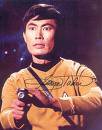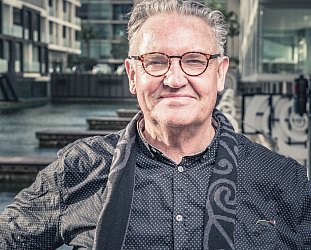Graham Reid | | 5 min read

George Takei - "it rhymes with okay" - began his career with a minor role as a crew member on the USS Enterprise. But Star Trek became a cult hit and Takei, as Mr Sulu, a star. Since then he has been in dozens of sitcoms, tele-series, movies and theatrical productions, and is involved in civic and political causes.
Are you keeping well?
Are you worried for me? I am hale and hearty and probably the spunkiest of the lot. I don't mean any inference by that, however.
You have had a remarkable career, but your early life seems equally fascinating. After Pearl Harbour you and your family were taken to detention camps.
I was a child so didn't understand, although I remember vividly the day soldiers with bayoneted guns came to our home. We were taken to a horse stable at a racetrack and for me it was great fun, I got to sleep where the horsies sleep. But my father had to sell our refrigerator and car for a dollar apiece, and the other stuff we abandoned to the vultures who took everything.
We were at the stable for three months while camps were being built, then we took that train ride to the swamps of Arkansas. What I remember of Arkansas was the barbed-wire fence and the machine-guns, but it became part of the landscape and everybody I knew lived in the black tar-paper barracks. It snowed in the winter and for a southern Californian kid it was magical.
I started kindergarten in the internment camp and learned the pledge of allegiance to the flag. I couldn't appreciate the irony. but today I remind people the pledge ends with the words "liberty and justice for all" and I was reciting that inside a barbed-wire fence.
By the time I started grammar school I knew my background was different. When they asked where I came from I'd say Arkansas, but I wouldn't give them details because I was ashamed. My parents were profoundly wounded by that experience.
You originally wanted to be an architect, so what seduced you into acting?
Actually my father wanted me to be an architect so I was studying at Berkeley as a good son. My father approved of an interest in the theatre but felt one needed to have a profession.
That made sense to me. I wanted to go to New York and study at the Actors Studio. My father knew the son he was saddled with so had a deal. He said the Actors Studio was a distinguished and respected school but didn't give you a diploma. If I was determined to go I had to go on my own. However, UCLA had a fine theatre-arts department and would give a piece of parchment. He said if I went there I would have a subsidy.
I was a very practical kid. I went with the subsidy.
 The Star Trek casting is reasonably well-known - how you started in the second pilot - but during that first season you were in John Wayne's Vietnam movie Green Berets.
The Star Trek casting is reasonably well-known - how you started in the second pilot - but during that first season you were in John Wayne's Vietnam movie Green Berets.
Green Berets came during the hiatus between the first and second season. During the first season I'd been lobbying [Star Trek creator] Gene Roddenberry for more interesting and bigger roles for Sulu and he kept saying, "Next season". He gave me those scripts when I took off for Georgia to film. I had my lines memorised for episodes like Trouble with Tribbles but because Green Berets ran over they brought in another actor, Walter Koenig, who played Chekhov. When I came back I hadn't met him, but despised him. But sometimes relationships like that become the richest; he's one of my best friends.
When Star Trek became successful did you feel you might be typecast?
Star Trek became successful after we were cancelled so it wasn't until we were into syndication that the ratings soared, and by then we were out pursuing careers. Some of my colleagues have complained that casting directors pegged them as "Scotty" or "Uhura" and can't see them as anything other than that.
I had another competitive edge - I was Asian-American. I have done many plays and British films and even an Australian film, Blood Oath, with Bryan Brown, in which Russell Crowe had a tiny part.
It was a war crimes trial movie so there were many Japanese roles and they cast all of them out of Tokyo except for the lead, in which they cast me. The producer said the reason was the only Japanese English-speaking actor who had any name was me. That was attributable to Star Trek.
You were one of the few Japanese-Americans on screen then.
Many young Asian-Americans have said my character was the only one they could feel proud of when they were growing up watching television. I'm glad my character served in that capacity. Role models are made by others. I didn't go out to be a role model.
After the series was over you ran for political office?
I ran for city council in Los Angeles. I was the chairman of Tom Bradley's Asian-American committee. He ran for mayor and when he was elected I ran for his old seat but did not prevail - I came in second by a heart-breaking three percentage points.
Why did you run?
My father emphasised we lived in a participatory democracy and good people had to hold the ideal of democracy to the fire because there are fallible people who make mistakes - like taking American citizens who happen to look like the enemy and incarcerating them without due process.
I was student body president and a delegate to the Democratic Conventions in '72 and '76. When that council vacancy came up friends urged me to run, again because of my Star Trek visibility. It turned out to be a liability, because Star Trek was in re-run while I was campaigning. I was on for 17 minutes and there's a ruling if a candidate for political office is given public airtime, then all others get equal time. So that television station had to give over a boring evening to this parade of candidates talking on issues because of me mouthing words written for a fictional character. It was preposterous.
I imagine you have something to say about the current political climate in the United States.
It's very chilling because, again, the nation is being swept by hysteria.
When the Oklahoma City bombing happened an Arab-American man got on a plane in New York to fly to London and was brought back simply because he was Arab-American. Yet the bomber was a blond, blue-eyed, crewcut, all-American boy ...
Japanese-Americans are in a particularly important position to comment on what is happening right now, especially about the Patriot Act. The very word "patriot" being associated with that assault on the fundamentals of our democracy is offensive.
That's a very serious note. Have you seen the Tim Allen movie parody Galaxy Quest? Is it like that on the sci-fi speaking circuit?
To me it's a stunningly realistic documentary.





post a comment